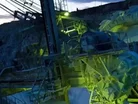‘Brexit-proof’ small mining project seeks to make big IMP@CT

IMP@CT, a new EU-funded project, hopes to improve the commercial viability of mining modest but high-grade critical raw mineral deposits across Europe.
Integrated Mobile Modularised Plant and Containerised Tools for sustainable, selective, low-impact mining of small, high-grade or complex deposits (IMP@CT), seeks to address the problem of a lack of investment in operations for critical raw materials that are produced in small quantities relative to traditional metal commodities because the potential return on investment is too low.
The IMP@CT project proposes a solution that develops a new switch on-switch off (SOSO) mining paradigm to improve the viability of many critical metal and other small complex deposits.
Using new and existing technology, project researchers have developed containerised, mobile and modular equipment that can be adapted for geological and metallurgical variability.
Supported by €7mn funding from the EU’s Horizon 2020 programme, researchers say it can improve the commercial viability of modest deposits. IMP@CT will be presented during November’s Horizon 2020 conference in Brussels when it is hoped the technology behind the approach will have been fully proven.
GlobalData note that because it is funded through Horizon 2020, IMP@CT will not be affected by Brexit: “Working with smaller mining companies, including UK-based Mineco and Metal Innovation, the IMP@CT project sets out to develop more resilient business models and better technology for smaller-scale mineral extraction.”
SEE ALSO:
Argo Natural Resources: rethinking natural resources
How drone technology is influencing the mining industry
DRA Global: helping mining companies realise the big picture for their projects
Read the latest issue of Mining Global here
Kate Moore, IMP@CT project lead and senior lecturer in critical and green technology metals at the University of Exeter, told GlobalData: “The raw materials supply sector has a problem responding rapidly to changes in demand from the technological manufacturing sector. We want to show a rapid response approach is technologically possible.
“This [technology] makes it possible to deploy an underground mining machine and a rock breaking facility in a matter of hours. A minerals processing facility can be set up in just a couple of weeks, compared to potentially decades from exploration to extraction for very big mining deposits and months-long installation activities.
“For countries that have a lot of technological manufacturing, but are dependent on imported raw materials, there’s going to be a big job to start raw material production within that economy. But it’s important for security of supply and not least because if we’re thinking about climate change, we need to also think about how far we’re shipping materials.”



